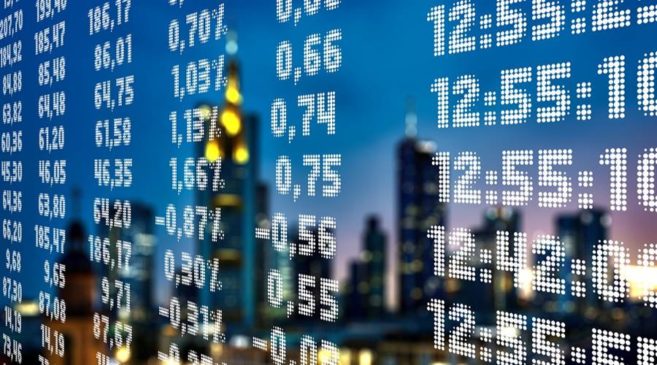On 1 February 2022, Moscow
Exchange
Exchange
An exchange is known as a marketplace that supports the trading of derivatives, commodities, securities, and other financial instruments.Generally, an exchange is accessible through a digital platform or sometimes at a tangible address where investors organize to perform trading. Among the chief responsibilities of an exchange would be to uphold honest and fair-trading practices. These are instrumental in making sure that the distribution of supported security rates on that exchange are effectively relevant with real-time pricing.Depending upon where you reside, an exchange may be referred to as a bourse or a share exchange while, as a whole, exchanges are present within the majority of countries. Who is Listed on an Exchange?As trading continues to transition more to electronic exchanges, transactions become more dispersed through varying exchanges. This in turn has caused a surge in the implementation of trading algorithms and high-frequency trading applications. In order for a company to be listed on a stock exchange for example, a company must divulge information such as minimum capital requirements, audited earnings reports, and financial reports.Not all exchanges are created equally, with some outperforming other exchanges significantly. The most high-profile exchanges to date include the New York Stock Exchange (NYSE), the Tokyo Stock Exchange (TSE), the London Stock Exchange (LSE), and the Nasdaq. Outside of trading, a stock exchange may be used by companies aiming to raise capital, this is most commonly seen in the form of initial public offerings (IPOs).Exchanges can now handle other asset classes, given the rise of cryptocurrencies as a more popularized form of trading.
An exchange is known as a marketplace that supports the trading of derivatives, commodities, securities, and other financial instruments.Generally, an exchange is accessible through a digital platform or sometimes at a tangible address where investors organize to perform trading. Among the chief responsibilities of an exchange would be to uphold honest and fair-trading practices. These are instrumental in making sure that the distribution of supported security rates on that exchange are effectively relevant with real-time pricing.Depending upon where you reside, an exchange may be referred to as a bourse or a share exchange while, as a whole, exchanges are present within the majority of countries. Who is Listed on an Exchange?As trading continues to transition more to electronic exchanges, transactions become more dispersed through varying exchanges. This in turn has caused a surge in the implementation of trading algorithms and high-frequency trading applications. In order for a company to be listed on a stock exchange for example, a company must divulge information such as minimum capital requirements, audited earnings reports, and financial reports.Not all exchanges are created equally, with some outperforming other exchanges significantly. The most high-profile exchanges to date include the New York Stock Exchange (NYSE), the Tokyo Stock Exchange (TSE), the London Stock Exchange (LSE), and the Nasdaq. Outside of trading, a stock exchange may be used by companies aiming to raise capital, this is most commonly seen in the form of initial public offerings (IPOs).Exchanges can now handle other asset classes, given the rise of cryptocurrencies as a more popularized form of trading.
Read this Term (MOEX), Russia’s main trading venue for equities, bonds, derivatives, FX and money markets, will add shares of 80 international companies including Fidelity National Financial, Crocs, Vimeo and others to its trading platforms. The popular stock exchange made such an announcement today, January 21. The move will enable Moscow exchange investors to purchase shares of such international companies and other issuers. Once shares and depository receipts of these firms are on trade on the exchange, the total number of foreign companies on the Moscow exchange will increase to 680. Furthermore, the exchange stated that the move is going to increase the number of international securities available for trading on its platform to 1,500 in 2022.
Besides that, the Moscow exchange said that all shares of international companies added to trading on the platform are available for both institutional and retail investors in Russia and other international countries. Apart from that, the exchange mentioned that the National Clearing Centre (NCC), which is part of the Moscow Exchange Group, will accept securities of international companies as collateral for trades madeon Moscow exchangemarkets. The move will allow professional market players and their clients more flexibility in funding their operations on the Moscow stock exchange and would assist in facilitating their trading activity.
Moscow exchange launched trading in international
equities
Equities
Equities can be characterized as stocks or shares in a company that investors can buy or sell. When you buy a stock, you are in essence buying an equity, becoming a partial owner of shares in a specific company or fund.However, equities do not pay a fixed interest rate, and as such are not considered guaranteed income. As such, equity markets are often associated with risk.When a company issues bonds, it’s taking loans from buyers. When a company offers shares, on the other hand, it’s selling partial ownership in the company.There are many reasons for individuals investing in equities. In the United States for example, equity markets are amongst the largest in terms of transactions, investors, and turnover.Why Invest in Equities?Overall, the appeal of equities the potential for high returns. Most portfolios feature some portion of equity exposure for growth.In terms of investing, younger individuals can afford to take on higher levels of equity exposure, i.e. risk. Consequently, these people have more stocks in their portfolio because of their potential for returns over time. However, as you are planning to retire, equity exposure becomes more of a risk.This why many investors or holders of retirement accounts transition at least part of their investments from stocks to bonds or fixed-income as they get older.Equity holders can also benefit through dividends, which differ notably from capital gains or price differences in stocks you have purchased.Dividends reflect periodic payments made from a company to its shareholders. They’re taxed like long-term capital gains, which vary by country.
Equities can be characterized as stocks or shares in a company that investors can buy or sell. When you buy a stock, you are in essence buying an equity, becoming a partial owner of shares in a specific company or fund.However, equities do not pay a fixed interest rate, and as such are not considered guaranteed income. As such, equity markets are often associated with risk.When a company issues bonds, it’s taking loans from buyers. When a company offers shares, on the other hand, it’s selling partial ownership in the company.There are many reasons for individuals investing in equities. In the United States for example, equity markets are amongst the largest in terms of transactions, investors, and turnover.Why Invest in Equities?Overall, the appeal of equities the potential for high returns. Most portfolios feature some portion of equity exposure for growth.In terms of investing, younger individuals can afford to take on higher levels of equity exposure, i.e. risk. Consequently, these people have more stocks in their portfolio because of their potential for returns over time. However, as you are planning to retire, equity exposure becomes more of a risk.This why many investors or holders of retirement accounts transition at least part of their investments from stocks to bonds or fixed-income as they get older.Equity holders can also benefit through dividends, which differ notably from capital gains or price differences in stocks you have purchased.Dividends reflect periodic payments made from a company to its shareholders. They’re taxed like long-term capital gains, which vary by country.
Read this Term in August 2020. The securities are traded in the main and after-hours trading sessions. Trades are settled in Russian rubles using MOEX’s robustinfrastructure, which includes a qualified record-keeping and centralcounterparty with the central securities depository (NSD).
How Moscow Exchange Is Boosting Its Market Share
The development by Moscow Exchange comes at a time when the stock exchange is committed to expand its business in order to enable its clients access wider market advantages. In the past 10 years, MOEX has witnessed evolutionary changes in the development of its exchange and the entire market. The exchange has gone beyond a traditional exchange business. It now offersvariousOTC services while also expanding its platform solutions and creating newopportunities for clients. In response to such significant changes, the exchange is changing its brand to reflect the scale and influence of the Group’s business. Moscow exchange is a trading avenue for more than 6,000financial instruments. It also incorporates the National Clearing Centre (the central counterparty for the exchange’s markets), the National Settlement Depository (Russia’s central depository), the country’s first Finuslugi financial marketplace, and a number of other companies. They are united under the umbrella brand of MOEX Group or the Moscow Exchange Group.
On 1 February 2022, Moscow
Exchange
Exchange
An exchange is known as a marketplace that supports the trading of derivatives, commodities, securities, and other financial instruments.Generally, an exchange is accessible through a digital platform or sometimes at a tangible address where investors organize to perform trading. Among the chief responsibilities of an exchange would be to uphold honest and fair-trading practices. These are instrumental in making sure that the distribution of supported security rates on that exchange are effectively relevant with real-time pricing.Depending upon where you reside, an exchange may be referred to as a bourse or a share exchange while, as a whole, exchanges are present within the majority of countries. Who is Listed on an Exchange?As trading continues to transition more to electronic exchanges, transactions become more dispersed through varying exchanges. This in turn has caused a surge in the implementation of trading algorithms and high-frequency trading applications. In order for a company to be listed on a stock exchange for example, a company must divulge information such as minimum capital requirements, audited earnings reports, and financial reports.Not all exchanges are created equally, with some outperforming other exchanges significantly. The most high-profile exchanges to date include the New York Stock Exchange (NYSE), the Tokyo Stock Exchange (TSE), the London Stock Exchange (LSE), and the Nasdaq. Outside of trading, a stock exchange may be used by companies aiming to raise capital, this is most commonly seen in the form of initial public offerings (IPOs).Exchanges can now handle other asset classes, given the rise of cryptocurrencies as a more popularized form of trading.
An exchange is known as a marketplace that supports the trading of derivatives, commodities, securities, and other financial instruments.Generally, an exchange is accessible through a digital platform or sometimes at a tangible address where investors organize to perform trading. Among the chief responsibilities of an exchange would be to uphold honest and fair-trading practices. These are instrumental in making sure that the distribution of supported security rates on that exchange are effectively relevant with real-time pricing.Depending upon where you reside, an exchange may be referred to as a bourse or a share exchange while, as a whole, exchanges are present within the majority of countries. Who is Listed on an Exchange?As trading continues to transition more to electronic exchanges, transactions become more dispersed through varying exchanges. This in turn has caused a surge in the implementation of trading algorithms and high-frequency trading applications. In order for a company to be listed on a stock exchange for example, a company must divulge information such as minimum capital requirements, audited earnings reports, and financial reports.Not all exchanges are created equally, with some outperforming other exchanges significantly. The most high-profile exchanges to date include the New York Stock Exchange (NYSE), the Tokyo Stock Exchange (TSE), the London Stock Exchange (LSE), and the Nasdaq. Outside of trading, a stock exchange may be used by companies aiming to raise capital, this is most commonly seen in the form of initial public offerings (IPOs).Exchanges can now handle other asset classes, given the rise of cryptocurrencies as a more popularized form of trading.
Read this Term (MOEX), Russia’s main trading venue for equities, bonds, derivatives, FX and money markets, will add shares of 80 international companies including Fidelity National Financial, Crocs, Vimeo and others to its trading platforms. The popular stock exchange made such an announcement today, January 21. The move will enable Moscow exchange investors to purchase shares of such international companies and other issuers. Once shares and depository receipts of these firms are on trade on the exchange, the total number of foreign companies on the Moscow exchange will increase to 680. Furthermore, the exchange stated that the move is going to increase the number of international securities available for trading on its platform to 1,500 in 2022.
Besides that, the Moscow exchange said that all shares of international companies added to trading on the platform are available for both institutional and retail investors in Russia and other international countries. Apart from that, the exchange mentioned that the National Clearing Centre (NCC), which is part of the Moscow Exchange Group, will accept securities of international companies as collateral for trades madeon Moscow exchangemarkets. The move will allow professional market players and their clients more flexibility in funding their operations on the Moscow stock exchange and would assist in facilitating their trading activity.
Moscow exchange launched trading in international
equities
Equities
Equities can be characterized as stocks or shares in a company that investors can buy or sell. When you buy a stock, you are in essence buying an equity, becoming a partial owner of shares in a specific company or fund.However, equities do not pay a fixed interest rate, and as such are not considered guaranteed income. As such, equity markets are often associated with risk.When a company issues bonds, it’s taking loans from buyers. When a company offers shares, on the other hand, it’s selling partial ownership in the company.There are many reasons for individuals investing in equities. In the United States for example, equity markets are amongst the largest in terms of transactions, investors, and turnover.Why Invest in Equities?Overall, the appeal of equities the potential for high returns. Most portfolios feature some portion of equity exposure for growth.In terms of investing, younger individuals can afford to take on higher levels of equity exposure, i.e. risk. Consequently, these people have more stocks in their portfolio because of their potential for returns over time. However, as you are planning to retire, equity exposure becomes more of a risk.This why many investors or holders of retirement accounts transition at least part of their investments from stocks to bonds or fixed-income as they get older.Equity holders can also benefit through dividends, which differ notably from capital gains or price differences in stocks you have purchased.Dividends reflect periodic payments made from a company to its shareholders. They’re taxed like long-term capital gains, which vary by country.
Equities can be characterized as stocks or shares in a company that investors can buy or sell. When you buy a stock, you are in essence buying an equity, becoming a partial owner of shares in a specific company or fund.However, equities do not pay a fixed interest rate, and as such are not considered guaranteed income. As such, equity markets are often associated with risk.When a company issues bonds, it’s taking loans from buyers. When a company offers shares, on the other hand, it’s selling partial ownership in the company.There are many reasons for individuals investing in equities. In the United States for example, equity markets are amongst the largest in terms of transactions, investors, and turnover.Why Invest in Equities?Overall, the appeal of equities the potential for high returns. Most portfolios feature some portion of equity exposure for growth.In terms of investing, younger individuals can afford to take on higher levels of equity exposure, i.e. risk. Consequently, these people have more stocks in their portfolio because of their potential for returns over time. However, as you are planning to retire, equity exposure becomes more of a risk.This why many investors or holders of retirement accounts transition at least part of their investments from stocks to bonds or fixed-income as they get older.Equity holders can also benefit through dividends, which differ notably from capital gains or price differences in stocks you have purchased.Dividends reflect periodic payments made from a company to its shareholders. They’re taxed like long-term capital gains, which vary by country.
Read this Term in August 2020. The securities are traded in the main and after-hours trading sessions. Trades are settled in Russian rubles using MOEX’s robustinfrastructure, which includes a qualified record-keeping and centralcounterparty with the central securities depository (NSD).
How Moscow Exchange Is Boosting Its Market Share
The development by Moscow Exchange comes at a time when the stock exchange is committed to expand its business in order to enable its clients access wider market advantages. In the past 10 years, MOEX has witnessed evolutionary changes in the development of its exchange and the entire market. The exchange has gone beyond a traditional exchange business. It now offersvariousOTC services while also expanding its platform solutions and creating newopportunities for clients. In response to such significant changes, the exchange is changing its brand to reflect the scale and influence of the Group’s business. Moscow exchange is a trading avenue for more than 6,000financial instruments. It also incorporates the National Clearing Centre (the central counterparty for the exchange’s markets), the National Settlement Depository (Russia’s central depository), the country’s first Finuslugi financial marketplace, and a number of other companies. They are united under the umbrella brand of MOEX Group or the Moscow Exchange Group.
Source



